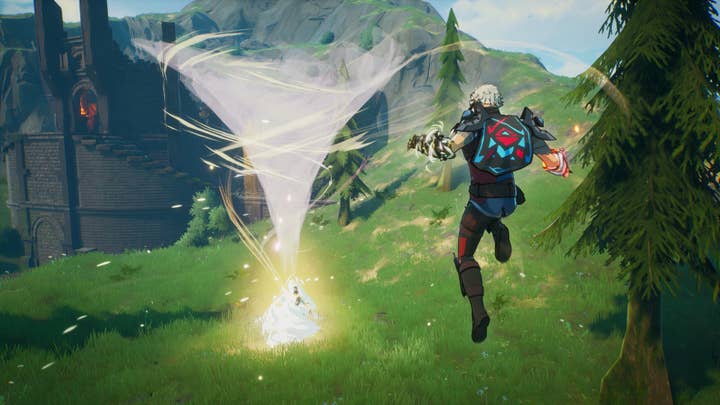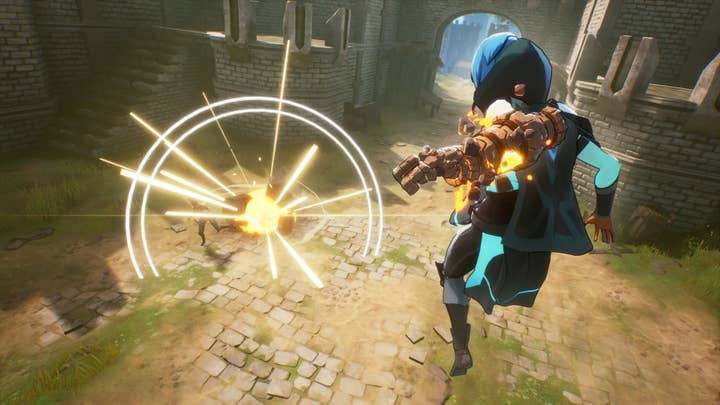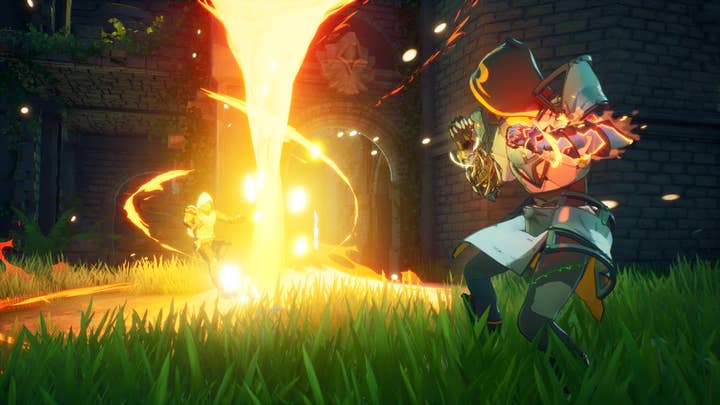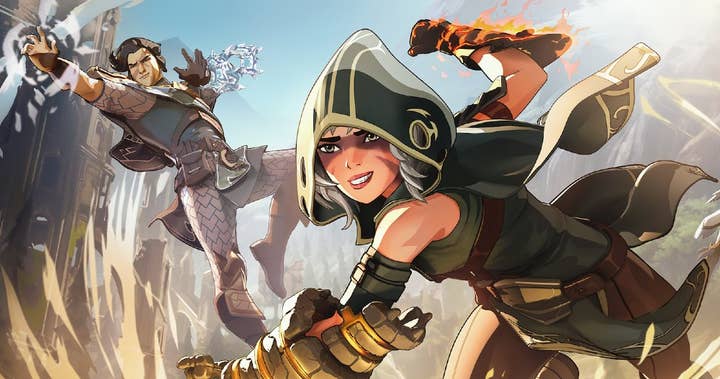Spellbreak's four-year incantation for streamable, shareable sorcery
Proletariat CEO Seth Sivak discusses the studio's mobile beginnings, views on cross-platform, and reaction to the growing boom of battle royale
If you trace the legacy of the new magic-slinging battle royale Spellbreak from Proletariat, you'll find its roots lie in a surprising place for a cross-platform PC and console title: they're in mobile gaming.
Proletariat was started almost eight years ago when five developers coming out of the Zynga Boston shut-down decided they wanted to keep making games together, beginning with a 2015 mobile title called World Domination.
"We grew this strong focus on wanting to build games that could distribute themselves," CEO Seth Sivak tells GamesIndustry.biz. "So we saw what was working for us at the time -- this was [prior to] influencer marketing being that big a deal. We were doing individual deals with YouTubers; it was so funny because we were trying to write contracts with these 16-year-olds to get them to make videos for the game. And this was because none of the infrastructure existed at that point. And that got us really interested in building games that were very watchable, streamable, and shareable."
"When PUBG hit, because it happened so quickly, it was very much validation for us"
Eventually, Proletariat moved from mobile games to PC titles with Streamline, but the desire for self-distributing titles persisted. Streamline was the first title to launch through Amazon's Twitch Prime public launch in 2016, which made it available for sale on the platform as part of its bid to tackle PC distribution. Twitch Prime quickly pivoted away from its original distribution plans, however, and with that experiment abandoned, Proletariat moved to work on Spellbreak later that year.
Sivak says that the initial idea for Spellbreak came out of the team asking once again what was "streamable and shareable." The game has been a battle royale since its conception, which happened pre-PUBG and pre-Fortnite. At the time, Sivak says, H1Z1 was the only thing resembling what they were doing, and Proletariat was interested in doing a fantasy spin on the idea.
The team built two prototypes. One was a Dota 2 mod released through one of the developer's personal accounts, and the other was code-named Ragnarok, with more Viking inspiration than the final game has. In 2017, they began the process of smashing the two games together into what is now Spellbreak.

And then, at the end of December 2017 and with Spellbreak still several years away from release, PUBG launched. But far from being discouraged, Sivak says the team saw it as proof that their idea had merit.
"When PUBG hit, because it happened so quickly, it was very much validation for us," he says. "Because we also felt like we still had something very different. We were doing fantasy, and the early versions we were looking at were a combination of spells and traditional fantasy swords, shields, bows, and arrows. Over time, we just ended up cutting all of that, because the magic was really the thing that stood out.
"I think if we were making a shooter, that would have been a different conversation, but because we weren't, we were in a good position to see it as validation."
"We talk about battle royale as a genre, but it's not really a genre. It's a game mode"
Spellbreak did go through an almost shooter-like iteration where the combat involved something closer to magic arrows, he admits, but a desire to avoid resembling that genre pulled them away from that design. It also had melee combat at one point, but Sivak says that a free-for-all melee combat system proved problematic in a battle royale where players could just run away from others indefinitely.
"We talk about battle royale as a genre, but it's not really a genre," he continues. "It's a game mode. The genre that Spellbreak falls into is like a magic spellcasting game in the same way that what differentiates Fortnite is that it's a shooter, but it's a builder-shooter. The core gameplay is very different.
"So when I look at the difference between something like Fortnite and PUBG, PUBG is more like a bullet simulator shooter, and the gameplay is different even from what you see from Call of Duty. So that made us feel that the theme, the art style, and the core gameplay set us apart, and the only thing that kept us together was the game mode."
By 2018, Proletariat had begun to develop a Discord community around the game
-- a necessity for testing the game through its pre-alpha, alpha, and two betas. For a significant period of its development, Proletariat wasn't big enough as a studio to test a full match with only developers, and Sivak says that most of the game was built with a team between 30 and 50 people. At the beginning of this year, Proletariat was around 50 employees.

Though Sivak made a point to differentiate Spellbreak from other games with battle royale modes earlier, it's hard to look at this picture of a small team launching a live service title and not recall the developers at Epic Games who spoke out last year about the increasingly oppressive working conditions on Fortnite following its 2017 launch as the studio was rapidly forced to scale up its operations.
Admittedly, Spellbreak isn't quite doing Fortnite numbers, but it did pass over five million players in its first month, and Sivak says Proletariat wants to keep it going long-term with regular content updates.
"In order to operate a live service game across four-plus platforms... it ends up being a pretty big team in order to run it"
Which is why, as of mid-September, Proletariat had doubled its numbers from the start of the year to around 100 employees.
"In order to operate a live service game across four-plus platforms... and especially if you're putting out large-scale DLC every three months, right... it ends up being a pretty big team in order to run it," Sivak says, adding that they intend to grow the team even more in the coming months.
"I think everyone's feeling a little bit of a strain in the current world situation. But we've been thinking about this from the start in terms of how we want to staff and grow the team. It's clear that the current team size is not going to be big enough for us to be able to run this the way we want. Even from the start, we thought a lot about how we can deliver really great ongoing content for players in a way that builds off of the systems that we put in the game.
"We really benefit from some of our systems... that are very expandable, so we don't have to build [the same amount of content] that some of these other games need to put out. Just a new gun in one of these games, it's not interesting enough. They need to do something much, much bigger, where a new gauntlet for us is a huge deal because it interacts with all these other pieces.
"We've been running live ops off and on for two years prior to the release of the game. So that gave us a lot of time to build up the processes to do this, and we still have a lot to learn, and we still have a long way to go. But it's given us a lot of hope that I think it is sustainable."

Aside from its plans for long-term live service operation, another point Proletariat has been adamant on has been the importance of cross-platform play and cross-progression. The game launched with both features across all four platforms it was released on: PC via the Epic Games Store, PS4, Nintendo Switch, and Xbox One.
"I feel very strongly that every multiplayer game should be cross-platform with cross-progression. Especially now, where everyone is separated from each other and locked down"
"It is not as easy as I wish it was," Sivak says. "I feel very strongly that every multiplayer game should be cross-platform with cross-progression. Especially now, where everyone is separated from each other and locked down, the idea that people aren't able to play with their friends because of a hardware choice seems crazy, right?"
He outlines three key "pieces" of implementing cross-platform play that make it so challenging for developers. The first is the raw technical challenge of building a standalone friend and social system, which alone is a lot of work for a smaller studio.
"There are pieces that are coming online, Epic's online services, other things like that, that are making it a little bit easier," he says. "But some of that stuff is just not there yet. And so hopefully, two or three years from now, we're not having this conversation. But it is really difficult technically to do, and also to do at scale."
The second piece is process, or being able to ship on all four platforms at the same time in terms of testing and making sure it all works at the same time. And the third, he says, involves working with partners.
"I think at this point they're all pretty positive on wanting to make cross-play and cross-progression available," Sivak says. "But it's still work. There's still communication, there are still challenges, and that has ramifications on the product itself. There are different requirements on different platforms. Like, can you show the logo of the platform that the player is on on this platform? Some platforms allow it and some don't. And so there's a lot of back and forth and trying to figure that out."

